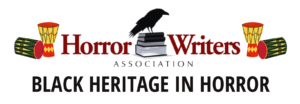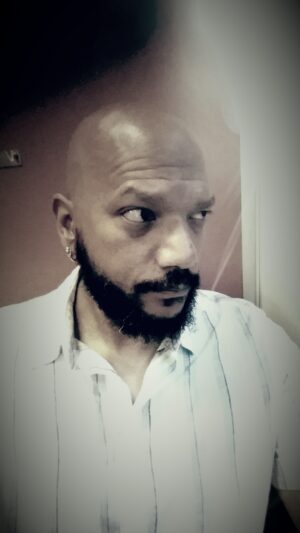Black Heritage in Horror Month 2024: An Interview With Errick Nunnally

What inspired you to start writing?
It was a short journey from comic books to science fiction novels. My mother used to read comics to me along with Dr. Seuss and all the rest. Spinner racks for comics at local drug stores eventually led to bookstores and the sci-fi/fantasy/horror sections. Crazy covers!
What was it about the horror genre that drew you to it?
I’ve always enjoyed monster stories. For folks my age, the gateway was probably Creature Double Feature, Kolchak: The Night Stalker, and various late-night movie showings. I didn’t grow up in a neighborhood of readers which, I believe, is one of the best ways to have books recommended to you. So I saw movie and television adaptations long before realizing they were novels! When I got to bookstores, I was mostly on my own and didn’t tend to read what most other authors my age read.
Do you make a conscious effort to include African diaspora characters and themes in your writing and if so, what do you want to portray?
One hundred percent. Not seeing myself (or my world) portrayed in the genres I loved was a notable omission. Damaging, actually, in hindsight. I want to be part of making inclusion normal. All of humanity should be on the page. I tend to write in more of a thriller style when it comes to sci-fi and horror. I’m looking to write escapist art where the reader can enjoy something terrifying safely. As for who I’m trying to portray, it’s protagonists who are forever altered when they come out of a crisis, whether they survive or not.
What has writing horror taught you about the world and yourself?
To not ignore fear and that horrific things can often be transformative.
How have you seen the horror genre change over the years? And how do you think it will continue to evolve?
I’m not sure it’s changed all that much! What I mean is that various sub-genres have risen and fallen over the decades, in my experience. At various points, hauntings are incredibly popular while in others vampires rule and then it’s demons or kaiju or cultural horrors run amok. What I see coming is more and more authors bringing their own cultural backgrounds to bear on a beloved genre and it’s fantastic to see.
How do you feel the Black community has been represented thus far in the genre and what hopes do you have for representation in the genre going forward?
The Black community has had a rich history in the horror genre but it hasn’t been a very popular one until the last decade or less. The representation was fairly awful outside of stories written and produced by Black creators. That’s changing, for sure. The industry tends to put too much weight on stories that aren’t best-sellers, but it takes some failure to find some success. Black folks need to be afforded the same opportunities to learn from failure and be included in the guidance that keeps people moving forward and growing. It’s in failures that we find successes! So when industry gatekeepers play a one-and-done game with authors who don’t look like them, they’re playing the same old institutional garbage song. Not everything is going to be a home run, it’s unpredictable.
Who are some of your favorite Black characters in horror?
Probably “Ben” as portrayed by Duane Jones in the film “Night Of The Living Dead.” From a horror novel, though, “Grady Hicks” from Brian Keene’s “The Complex” or “Arkansas” from Ed Kurtz’s “Dead Trash.” I think my predilection for pulp adventure heroics skews my idea of ‘favorite,’ however.
Who are some African diaspora horror authors you recommend to our audience check out?
Wrath James White, Chesya Burke, Zin E. Rocklyn, Craig L. Gidney, Maurice Broaddus, Sumiko Saulson, Michelle Renee Lane, Nicole Givens Kurtz—I’m sure I’m forgetting a few others…
What is one piece of advice you would give horror authors today?
Mine the shit that hurt you and don’t flinch. It’s not easy and I don’t do it often, but it’s those pieces that have been the most successful for me.
And to the Black writers out there who are just getting started, what advice would you give them?
Write the stories you want to read and pack them with emotion, sensory cues, and memories. You’ll never get to the other parts of being an author if you don’t have content to share!
 Bio:
Bio:
Errick Nunnally was born and raised in Boston, Massachusetts, he served one tour in the Marine Corps before deciding art school would be a safer—and more natural—pursuit. He is permanently distracted by art, comics, science fiction, history, and horror. Trained as a graphic designer, he has earned a black belt in Krav Maga/Muay Thai kickboxing after dark, and first prize in one hamburger contest. Errick’s writing includes: the novels, BLOOD FOR THE SUN, ALL THE DEAD MEN, and LIGHTNING WEARS A RED CAPE; a comic strip collection, LOST IN TRANSITION; and a short novel THE QUEEN OF SATURN AND THE PRINCE IN EXILE, due out in 2025 from upstart publisher Clash Books. The following are some magazines and anthologies that he has appeared in: Galaxy’s Edge; Fiyah Literary Magazine; Lamplight; and Nightlight, a Black Horror Podcast. Eventually, Errick came to his senses and moved to Rhode Island with his two lovely children and one beautiful wife. Visit erricknunnally.us to see more of his work.



